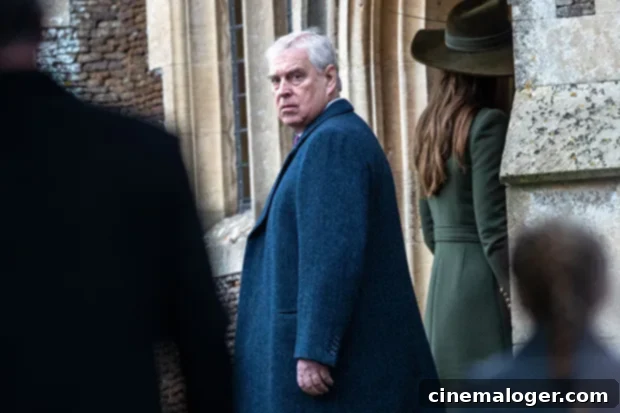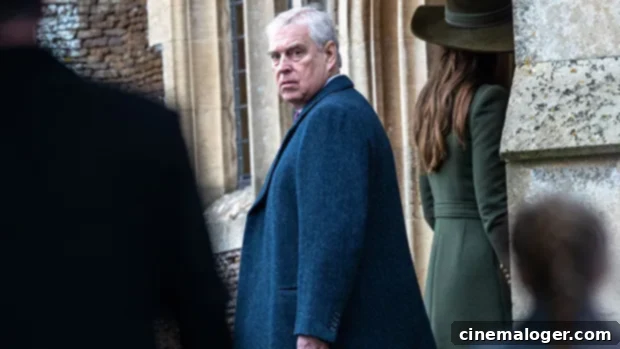Prince Andrew Evicted from Buckingham Palace Amid Virginia Giuffre Memoir Release
In a significant move that underscores the British Royal Family’s ongoing efforts to distance itself from controversy, King Charles III has reportedly instructed his younger brother, Prince Andrew, to vacate his remaining private quarters at Buckingham Palace. This directive comes shortly after reports emerged that Virginia Giuffre, the woman who accused Prince Andrew of sexual assault and settled a civil lawsuit against him, has signed a lucrative deal to publish a tell-all memoir. The timing of these events signals a decisive shift in the monarchy’s approach to the Duke of York, whose association with convicted sex offender Jeffrey Epstein has cast a long shadow over the House of Windsor.
The Duke of York’s Retreat from Royal Life and Buckingham Palace
Prince Andrew, 62, has faced increasing isolation and public disgrace since his ties to Jeffrey Epstein became widely known. Following a disastrous BBC Newsnight interview in 2019, and the subsequent civil lawsuit filed by Virginia Giuffre, Andrew was stripped of his honorary military titles and royal patronages in January 2022. This unprecedented action effectively removed him from public royal duties and severed formal links with the institutions he represented. However, despite these severe repercussions, Andrew had reportedly retained a suite of rooms at Buckingham Palace, a significant perk that allowed him to maintain a foothold, however symbolic, within the heart of the monarchy.
Reports from The Sun indicate that King Charles has now made it unequivocally clear that “Buckingham Palace is no place for Prince Andrew.” This latest development marks a further erosion of Andrew’s connection to the royal establishment, signaling his complete removal from any official presence at the monarch’s primary residence. The move solidifies King Charles’s commitment to streamlining the monarchy and removing individuals whose past actions could tarnish the institution’s image.
For decades, Buckingham Palace served as more than just a residence for Prince Andrew; it was a symbol of his status and proximity to power. As The Sun detailed, Andrew “loved having a suite at Buckingham Palace where he was not only set up for marital life with Sarah Ferguson but used it as a bachelor’s pad after his divorce.” This suite, reportedly a sprawling 30-room apartment, was a hub for his social life, with Andrew even bringing high-profile dates like model Caprice back to the Palace. The article adds, “A bachelor’s flat in St James’s Palace doesn’t have the same allure for a single man,” highlighting the perceived downgrade in his living arrangements. The eviction comes a year after Andrew was also instructed to close his office at Buckingham Palace, further diminishing his institutional links. Coincidentally, the Palace is set to undergo a massive 10-year, $400 million renovation project, which may provide a practical justification for the move, though the symbolic weight of the decision is undeniable.

Virginia Giuffre’s Memoir: A New Chapter in the Scandal
The timing of Prince Andrew’s eviction from Buckingham Palace is particularly striking, arriving on the heels of major news regarding his accuser, Virginia Giuffre. Reports indicate that Giuffre has secured a multi-million-dollar deal to publish a memoir detailing her experiences. According to the New York Post, this deal is “believed to be worth millions,” and its announcement coincides with the imminent expiration of a one-year gag order that was part of the settlement she reached with Prince Andrew in 2022. This settlement, which saw Andrew reportedly pay Giuffre $14 million to resolve the civil sex abuse lawsuit out of court, explicitly stated that Andrew did not admit any wrongdoing and he has consistently denied her claims.
The impending memoir is poised to reignite public discussion surrounding the accusations against Prince Andrew and the broader scandal involving Jeffrey Epstein. While the terms of her settlement with Andrew may restrict how deeply Giuffre can delve into her direct interactions with the Duke of York, the memoir is expected to offer an unprecedented, unfiltered account of her ordeal. As The Daily Beast speculated, Giuffre may instead “detail her ordeal being Jeffrey Epstein’s teenage sex slave,” providing crucial insights into the vast and disturbing network operated by Epstein and his associates. The narrative potential of this memoir, even with certain limitations, holds immense significance for understanding the human cost of Epstein’s crimes and the continuing fallout for those implicated.

Ghislaine Maxwell’s Denials and the Infamous Photo
Adding another layer of complexity to the ongoing narrative, Ghislaine Maxwell, Jeffrey Epstein’s associate who was convicted in 2021 of five sex trafficking counts, including one count of trafficking a minor, has continued to issue denials from prison. In a recent jailhouse interview conducted on Monday, January 23, Maxwell astonishingly claimed that the infamous photograph depicting Prince Andrew with his arm around a then 17-year-old Virginia Giuffre’s bare midriff was “fake.” This photo has long been considered a key piece of evidence by Giuffre and others, vividly illustrating the alleged association between Andrew and Epstein’s circle. Maxwell’s repeated claims of the photo’s inauthenticity, despite forensic analyses and witness accounts suggesting otherwise, are seen by many as a desperate attempt to rewrite history and undermine the credibility of victims. Her persistent refusal to acknowledge her crimes and offer apologies further highlights the deep-seated issues surrounding this complex and sensitive case.
Prince Harry’s Perspective: A Family Divided
The controversies surrounding Prince Andrew have also been brought into sharp focus by other members of the Royal Family, particularly through Prince Harry’s highly anticipated memoir, Spare. In his book, King Charles’s youngest son openly criticized the Palace’s perceived inadequate reaction to his uncle’s scandal. Harry wrote, “Despite being involved in an embarrassing scandal, accused of having sexually abused a young woman, nobody had suggested removing his security.” This pointed remark highlights a significant grievance for Harry, who, along with his wife Meghan Markle, famously clashed with the Royal Family over the removal of their own security detail after stepping back from royal duties. Harry juxtaposed their situations, stating, “People may have a lot of grievances towards us, but sexual offenses weren’t one of them.” His words underscore the deeply unsettling nature of Andrew’s entanglement and its corrosive effect on the monarchy’s public image, creating a perceived double standard within the royal institution itself.
The Monarchy’s Future: Streamlining and Accountability
King Charles III’s decision to evict Prince Andrew from Buckingham Palace is more than just a logistical move; it’s a powerful statement about the direction of the modern monarchy. Since ascending the throne, King Charles has reportedly sought to create a more streamlined and efficient institution, one that is less burdened by past controversies and more attuned to public expectations of accountability. Andrew’s continued presence, even in a private capacity, at the monarch’s primary residence was increasingly untenable, especially with the renewed scrutiny brought by Virginia Giuffre’s memoir. This latest action signifies a clear effort to protect the crown’s reputation and further isolate Andrew from any official royal capacity.
The ongoing saga of Prince Andrew, Jeffrey Epstein, and Virginia Giuffre represents a profound challenge for the British Royal Family. While Andrew consistently denies the accusations, the public perception and the sheer weight of the scandal have necessitated drastic measures. The eviction from Buckingham Palace, combined with the imminent release of Giuffre’s memoir, ensures that this chapter in royal history remains far from closed. As the monarchy navigates its future, it is clear that King Charles is prepared to make difficult decisions to safeguard the institution’s integrity and adapt to a world that increasingly demands transparency and accountability from its most prominent figures.
